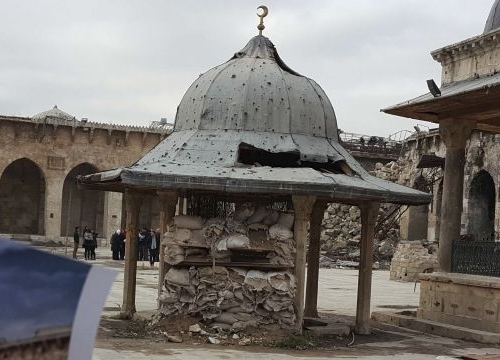Book Launch: Cultural Heritage and Mass Atrocities
Event


ICRC
Intentional destruction of cultural heritage has a long history. Contemporary examples include the Bamiyan Buddhas in Afghanistan, mosques in Xinjiang, China, mausoleums in Timbuktu, Mali, and Greco-Roman remains in Syria. Cultural heritage destruction invariably accompanies assaults on civilians, making heritage attacks impossible to disentangle from the mass atrocities of genocide, war crimes, crimes against humanity, and ethnic cleansing. Both seek to eliminate people and the heritage with which they identify.
The new book Cultural Heritage and Mass Atrocities, edited by James Cuno and Thomas G. Weiss, assembles thirty-eight experts from the heritage, social science, humanitarian, legal, and military communities. Focusing on immovable cultural heritage vulnerable to attack, the volume’s guiding framework is the Responsibility to Protect (R2P), a United Nations resolution adopted unanimously in 2005 to permit international intervention against crimes of war or genocide.
Essays consider the global value of cultural heritage and document recent attacks on people and sites in China, Guatemala, Iraq, Mali, Sri Lanka and Afghanistan, Syria, and Yemen. Comprehensive sections on vulnerable populations as well as the role of international law and the military offer readers critical insights and point toward research, policy, and action agendas to protect both people and cultural heritage.
At this book launch – co-organized with the University of Geneva Law Faculty, the UNESCO Chair in the International Law of the Protection of Cultural Heritage at the University of Geneva and Getty Publications – one of the book’s editors will discuss cultural heritage and mass atrocities with contributors to the book and specialists.
Welcome
- Professor Gloria Gaggioli, Director, Geneva Academy
Introduction and Moderation
- Professor Marc-André Renold, Law Faculty, University of Geneva
The Book
- Professor Thomas G. Weiss, CUNY Graduate Center, New York
Roundtable with contributors to the book and specialists
- Benjamin Charlier, Legal Advisor, International Committee of the Red Cross
- Dr Alessandro Chechi, Lecturer, Law Faculty, University of Geneva
- Elisabeth Decrey, Founder, Geneva Call
- Dr Maja Kominko, Scientific and Program Director, ALIPH
- Professor Peter Stone, UNESCO Chair, Newcastle Univesity








